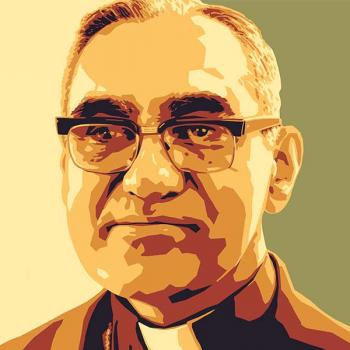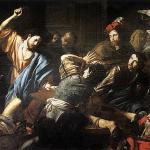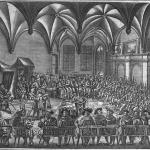“Of the martyrs in Palestine, Silvanus, bishop of the churches about Gaza, was beheaded with thirty-nine others at the copper mines of Phæno.”[1]
Today, the Church remembers the Saint Silvanus, bishop of Gaza. We know little about him, though it seems he was a soldier who decided to serve God, gave up soldering and became a priest, and then, eventually a bishop. He must have been successful in evangelizing the region, converting pagans to the Christian faith, because he was to be one of many punished and eventually killed under the reign of Diocletian. His death occurred around the year 311.
As a Christian, Silvanus learned the true path of courage is not that of violence, but of non-violence, of loving servitude towards those who would destroy him. In the mines, he kept not only his own faith alive, but that of his fellow-Christians. The world sought to break him, to make him one of its own, but he pushed on. He held out all the way; eventually, through such grueling work, he was worn-out, and then, seeing he was not broken, the Romans had him and his fellow Christians beheaded. The Romans thought this would bring the message of Silvanus to an end, but instead, it raised it up, made his life and message one to be remembered in all eternity.
His courage, a courage which stayed with him all the way through his life, could be seen in his death, as he had become a champion of Christ. He did take the coward’s way out by either denouncing Christ by word or by deed. The Romans would have appreciated either. They were quick to free Christians who verbally denounced the name of Christ. They could also understand and appreciate those who fought back, those who followed the path of violence that Rome had established. But St Silvanus did not fight back, knowing, as all the early martyrs knew, that they had been called by Christ to the path of love, and to be Christ’s disciples they could not fight back, even if it meant their death. To fight back would be to renounce Christ. The martyrs knew this which is why they did not organize any armed resistance to authorities. It was in their death the martyrs proclaimed their faith in Christ, showing that they would surrender all, even their very lives, to keep Christ’s commands. “”But I say to you that hear, Love your enemies, do good to those who hate you, bless those who curse you, pray for those who abuse you” (Luke 6:27-28 RSV). The path of Christ requires sacrifice; it requires courage; it requires one to willingly give up one’s own life for the sake of Christ. “Whoever seeks to gain his life will lose it, but whoever loses his life will preserve it” (Luke 17:33 RSV). They martyrs knew that in their death, the would do more to change the world than if they used the weapons of the world and tried to fight back. That would have been to acknowledge the truth of the world over and against Christ. Instead, they lived and died for Christ. Many took the last moments of their life as another opportunity to preach Christ; they tried to convert their would-be executioners, showing even then that they followed Christ and forgave those who would seek them ill.
The earliest Christians found that the words of Zechariah would be time and again proven true: “Not by might, nor by power, but by my Spirit, says the LORD of hosts” (Zech. 4:6b RSV). Rome tried to change the world by force. They tried to squash the Christians by force. They tried to convert Christians to Caesar-worship. That force was not successful. Those who the Romans viewed as weak and powerless would become victorious. The Christians would convert Rome through the Spirit of the Lord, which would be seen at work in the way the Christians would boldly take on martyrdom for Christ. They would receive the reward promised them by Christ. “Truly, truly, I say to you, he who hears my word and believes him who sent me, has eternal life; he does not come into judgment, but has passed from death to life” (John 5:24 RSV). They had heard Christ. They listened to his words. They followed them, no matter how difficult it was. Their human side, probably, wanted them to react, to deny Christ in word or in deed. But they were strengthened by love, and in that love they would be able to show what true courage is all about. They died to the world, only to receive eternal life.
We Christians, who have given so much to the way of the world, need to be reminded, time and again, what Christ commands of us. We need to overcome the cycle of death and violence, of the culture of death which surrounds us. We need to remember we are called to the kingdom of God, the kingdom of love. Love desires the conversion of others, not their destruction. When we hear of violence aimed against Christians in the world today, while it us understandably human to want to fight back, the Christian response is to love back. Love has covered a multitude of sins in the past. Love has converted the hearts of the most vile of tyrants in the past. It takes courage to love as a Christian. But that courage, when followed, brings more results than any that can be had by the sword, by the gun, or by the bomb. Christianity elevated the world through love. Is it not about time for Christianity to do so once again?
[1] Eusebius, Church History in NPNF2(1):334 [VIII, xiii]
















